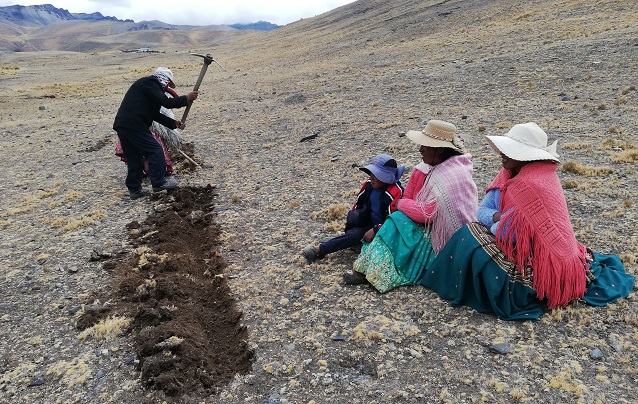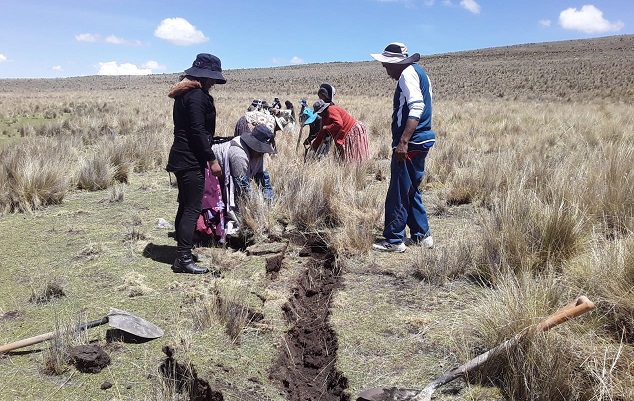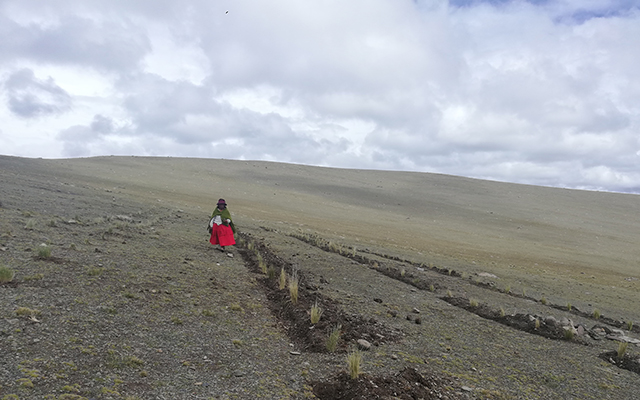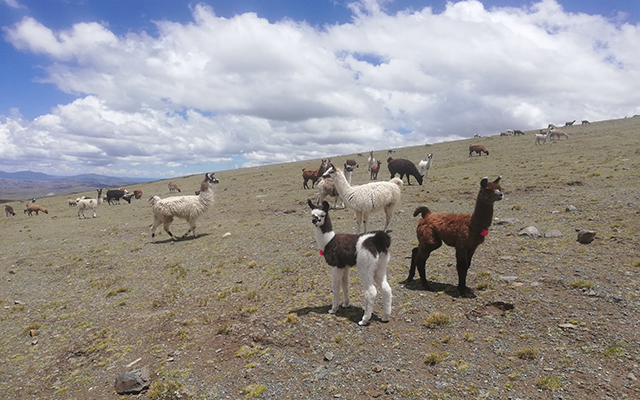Holistic grassland management for camelid production in Bolivia
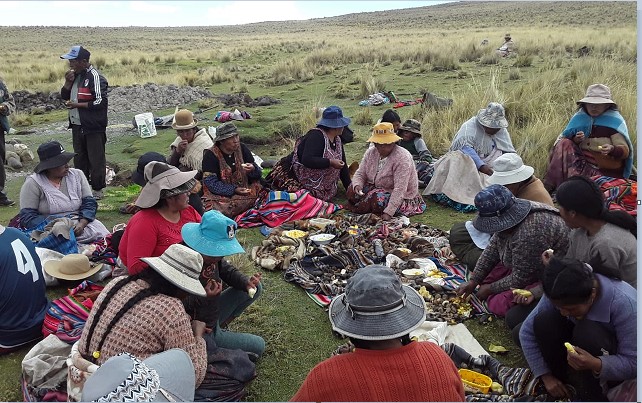
Jaillihuaya is a community in the Bolivian highlands, close to Titicaca. Most of its members live from camelid herding. The region is regularly affected by droughts, frost, hail, and strong winds. The IKI Small Grants project aims to support camelid cattle farmers to improve their adaptive capacities to the impacts of climate change. It uses efficient soil and water management as well as agroecological practices that are combined in a holistic management approach. This approach helps to increase the soil vegetative cover and the forage production in grasslands. It values local and traditional knowledge and upscales it – in combination with modern agricultural practices. The project is based on a participative implementation method. Camelid farmers engage throughout the project cycle. They contribute to planning, implementing, monitoring and evaluating the project.
INITIAL SITUATION
The Bolivian highlands are characterised by unfavourable climate conditions, in addition to a rugged topography, shallow soils, and widespread poverty which affects 96% of the rural population. Efficient agricultural production is difficult.
The Jaillihuaya community is located in the Bolivian highlands between 3,510 and 4,350 metres above sea level and is affected by droughts, frost, hail and strong winds. Its main economic activity is camelid farming, which is not very profitable. The regional grasslands are degraded, have low carbon content and show low plant cover. This contributes to low fodder production for the animals. Culturally, producers use traditional production systems that are not able to cope adequately with the current impacts of climate change. Nevertheless, the community has the potential to improve its camelid production, since the producers bring valuable traditional knowledge to cope with adverse climate conditions.
TARGET GROUP
The project works with Jaillihuaya camelid producer associations and the autonomous municipality of Batallas. The target group consists of 31 families of small camelid farmers, who usually have low investment capacities, a low level of education, and little access to technology. However, their experience with nature and its adversities makes them experts in coping with the local conditions. They are inclined to improve the production system that will further improve their economy. Indirect beneficiaries are other neighbouring families who also benefit from new production approaches and the bound local capacities to adapt to climate change.
The project further involves local authorities and municipal technicians by awareness rising sessions and project monitoring meetings, which outline the project´s objective and development. This approach helps to obtain a possible extension of the project to other communities.
APPROACH AND ACTIVITIES
The IKI Small Grants project strengthens local capacities of camelid farmers to adapt to the impacts of climate change. It aims to change their attitudes towards adaptation measures by combining local knowledge with new approaches or production alternatives. Farmers are informed to make more social, economic and environmental decisions aimed at efficient and sustainable food production.
Through a training and technical support strategy, camelid producers in the town of Jaillihuaya learn agro-ecological practices that lead to better water availability and increased vegetative cover on the land. Producers learn about the causes and impacts of climate change in agricultural production. They are encouraged to design and implement production plans for climate change adaptation based on efficient management of soil and water resources.
The implementation of these practices, such as transplantation of indigenous species, construction or improvement of infiltration ditches, and rustic irrigation channels, are part of a holistic management approach. This approach leads to a sequence of processes for the sustainable management of productive ecosystems based on appropriate decision-making by the camelid producers. It enables them to improve their quality of life by creating economic wealth. Camelid producers contribute throughout the project cycle. They engage tothe planning, implementation, monitoring and final evaluation phases of the project. Together with them, the project identifies the main problems of the community and alternative solutions to adapt to the impacts of climate change.
LATEST PROJECT HIGHLIGHTS AND IMPACTS
- Project finalized.
- Training and awareness-raising measures for 124 people, including 48 women
- Elaboration of adaptation plan for the community of Jaillihuaya
- Elaboration of 31 individual action plans for sustainable pasture management at farm level
- Installation of 36 kilometres of infiltration ditches to improve water and prevent soil erosion
- Local grass species planted on 31 hectares of degraded land
- 214 hectares of land sustainably managed because of the project measures
CAPACITY DEVELOPMENT
IKI Small Grants supports the Association for Strategic Development of the Environment in their organisational capacity development through a training in advanced fund raising and proposal writing
ABOUT THE ORGANISATION
ADEMA was established to contribute to the improvement of the quality of life of the rural population through the implementation of methodologies, participatory strategies and agroecological practices that facilitate the recovery, conservation and rational management of soils, water, vegetation cover and the agricultural and livestock resources, which generate increases in the productivity and economic income of rural families. With these tools they seek to strengthen social capital, gender equity, efficient and sustainable production in the context of climate change and strengthening the resilience of families.

